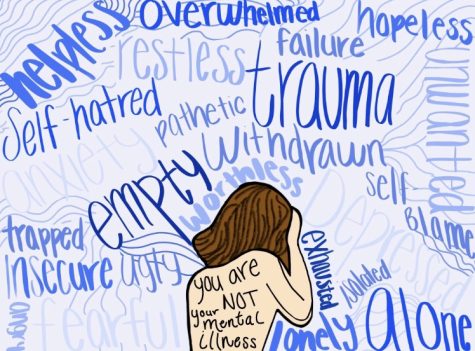The pandemics effect on mental health
October 28, 2021
Until recently, the term pandemic was only heard of in sci-fi movies and public health textbooks. Yet, 18 months ago when the world flipped upside down, it began to best describe our day-to-day lives. As per recommendations from top medical professionals to lower covid exposure, social isolation became the reality for millions of Americans. To some, while the initial “two weeks off of school” sounded like a vacation, others feared the threat of coming to terms with the new reality. For starters, the heightened stress about getting sick, spreading the virus, and reducing the overall risk is at the forefront of everyone’s minds, especially those who suffer from anxiety. In an effort to reduce social contact to stay safe, mentally ill people around the world are facing the repercussions.

Along with anxiety, surging rates of depression are closely related to the social isolation of the pandemic. The combination of uncertainty, whether it may be jobs at risk, the loss of a loved one, increased isolation, and overall restrictive behavior in comparison to daily life prior to the pandemic. With regard to schools in the United States following government-mandated virtual learning from the memorable weekend of March 13th, 2020 to the end of the school year, children and adolescents experienced the lack of social interaction necessary in their development.
Through the universal practice of social distancing, the loss of human contact and connection changed the way we live our lives. From 9-5 desk jobs with commutes to Zoom meetings for multiple hours to a day in pajamas, the societal work expectations greatly diminished from the typical idealities of “normal”. For those with underlying mental health disorders, symptoms of anxiety, depression, and obsessive thoughts have heightened significantly just to name a few. Take Obsessive-Compulsive Disorder (OCD): a chronic, long-lasting disorder in which a person has uncontrollable, recurring thoughts (obsessions), and behaviors (compulsions) on which one feels the urge to act on. Adding the pandemic into the mix led to increased awareness all around, whether it may be excessive hand washing to avoid contracting the virus or recurring thoughts aiming to reassure the anxiety. Coping with mental illnesses takes time, treatment, and adjusting. Yet, adding new triggers such as constant news headlines with information about staggering COVID-19 deaths or breaking news about new information can throw someone over the edge with fear of contracting or spreading the virus.

On another note, according to the National Institute of Health (NIH), the effect of the pandemic may precipitate the development of eating disorder behaviors, along with exacerbating the vulnerable population, such as those with body image and eating concerns. The National Eating Disorder Association (NEDA) reported experiencing a 68.1% increase to their helpline in the fall of 2020 compared to the same period in 2019, prior to the pandemic. With the world flipped upside down, the need to take control, aside from various other contributing factors, sparked a surge in eating disorders around the world.
At the same time, as schools were online, there was less control over cell phone use, including the increased absorption of the toxic culture of social media. Consumed by social media posts, comparing, and demand for control, combined with added fear and depression by lack of socialization, it became the perfect storm with all adequate factors adding up. The Wall Street Journal credits the CDC for data of an astronomical amount of mental-health-related emergency visits up 90% in 2021. In many scenarios, unfortunately, the impact of COVID-19 on adolescents caused a surge in mental illnesses, ranging from eating disorders to depression, OCD, and the list goes on.
To this extent, the extremely dangerous “side effect” of COVID-19 wasn’t the “long-haulers”, people experiencing COVID-like symptoms after negative test results, but the treatment necessary to return to day-to-day life. While the future is uncertain regarding when the pandemic will fade away into a historic period of our society, the effect of living through a global pandemic has touched on millions of people across the globe, including adolescents suffering from mental illness.